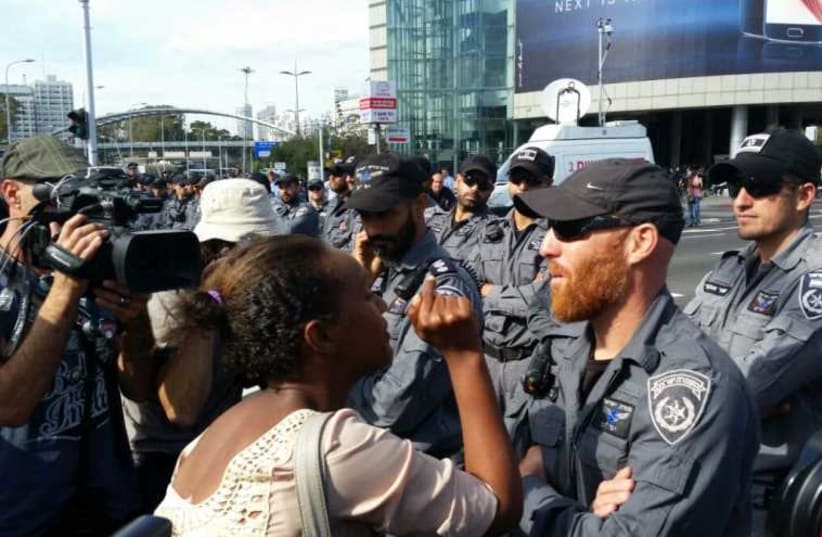
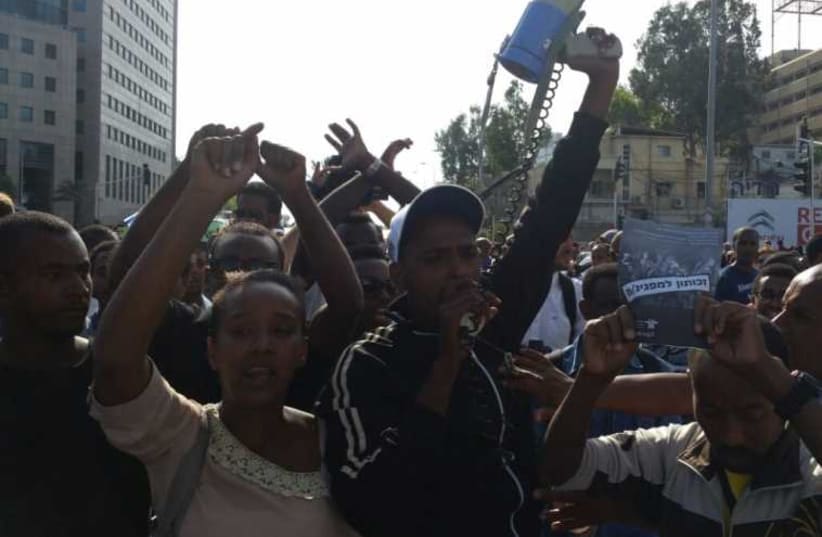
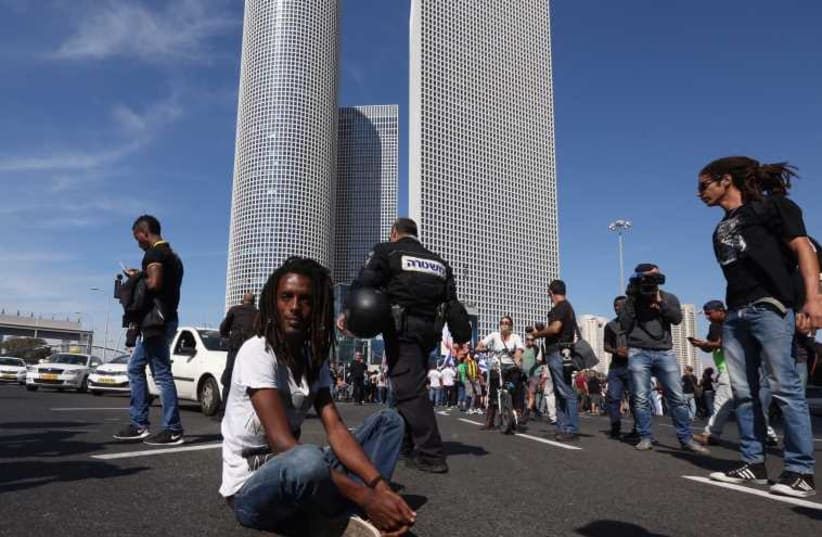
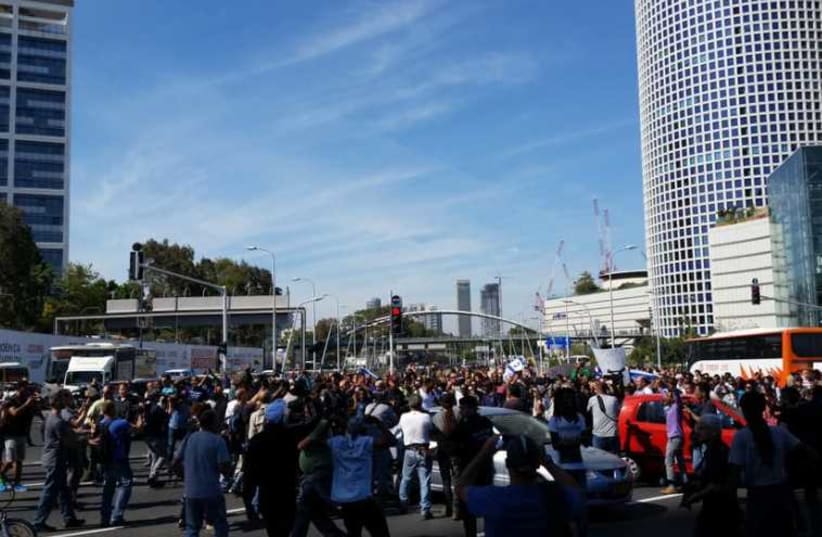
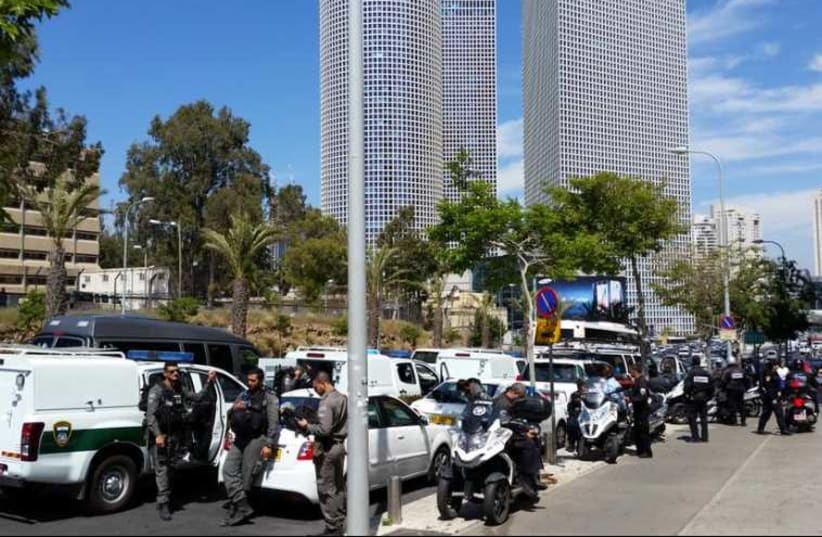
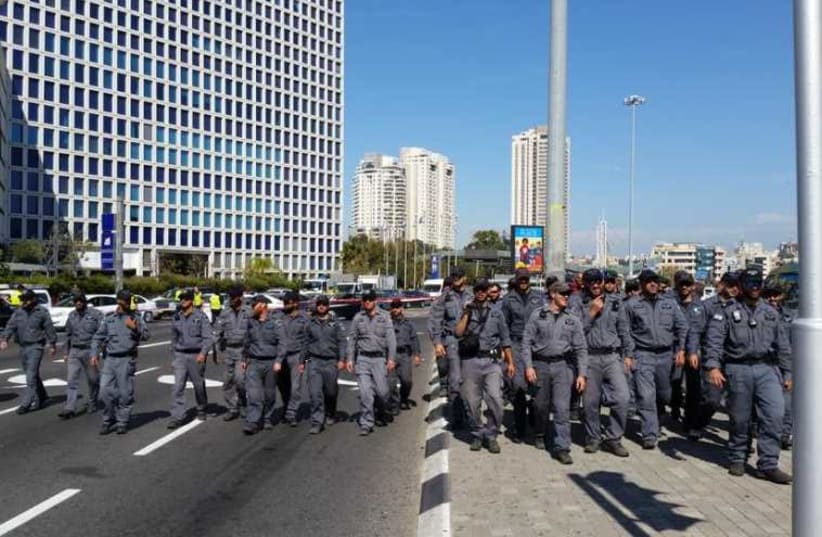

For hours the protest had been peaceful. The protesters – who numbered in the thousands and included a large contingent of non-Ethiopian Israelis – marched through central Tel Aviv and blocked both sides of the Ayalon freeway for over two hours during the afternoon rush hour.After leaving the Ayalon they marched to Rabin Square, and the scene quickly changed.Some witnesses said that when Public Security Minister Yitzhak Aharonovitch appeared, protesters surged toward city hall and riot police moved in. As the riot police gathered at the foot of the stairs, they were struck repeatedly by a volley of rocks, sticks, and plastic and glass bottles.Soon a melee erupted, and on the lower deck below city hall, a phalanx of mounted officers came under a sustained volley of rocks and bottles and charged the crowd. The protesters fell back and in a moment rallied, forcing the horses to gallop in the opposite direction as bottles and all types of projectiles – including at least one motorcycle helmet – soared at police both on foot and horseback.At that moment police began firing stun grenades in rapid procession, the explosions echoing through the square, which took on a smoky haze.Clashes continued, and by 11:30 p.m., police said, 26 officers had been injured. Magen David Adom paramedics said that by 11:30 p.m. they had treated 46 civilians and several police.There were reports of officers using tear gas, but police would not confirm this, and most witnesses reported seeing only pepper spray used by policemen making an arrest. Regardless, it was a violent scene the likes of which Tel Aviv has not seen in recent memory.By late evening a number of vandalized police cars and motorcycles stood immobile next to the square, and a few protesters were seen trying to light trash canisters.The protest was held just days after a similar one in Jerusalem ended with arrests and injured protesters and police. Both were triggered by a video of an IDF soldier of Ethiopian ethnicity in uniform being beaten by a policeman and a police volunteer in Holon.The protesters were mainly Israelis of Ethopian ethnicity, but they came from all walks of life and sectors of Israeli society.There were many familiar faces from left-wing protests in Tel Aviv and a number of MKs, such as Merav Michaeli (Labor) and Ilan Gilon (Meretz), but the vast majority were young Ethiopian Israelis from across the country, incensed about what they say is rampant police brutality against their community and a prevalent racism they feel in their everyday lives.One young Ethiopian Israeli man said, “I won’t be using my Hebrew name today,” but he is grateful for the videotaped beating of the Ethiopian Israeli soldier, for it finally forced the rest of Israeli society to see what is a fact of everyday life in his community.Asked if the protests were inspired by recent anti-police brutality protests in the United States, he said: “Maybe, but Israel copies everything from the US. They’ve copied the way the US treats black people.”Getanet, an Ethiopian Israeli father of three from Ariel, said the situation has worsened in Israel since he immigrated in 1984. He said something has changed, but couldn’t put his finger on it. He also said the message he wants to get across is one of solidarity, that racism affects all segments of Israeli society, not just Ethiopian Israelis.“We need to see this solidarity. I stand during the siren on Holocaust Remembrance Day. I can identify with others’ suffering. The rest of Israel needs to stand with us,” he said, adding that he fears how racism in Israel will affect his children’s future.Zehava Avera, a young woman from Netanya, said: “We’re here because this cop has to be put in jail. We’re tired of being abandoned and we don’t want to see one more soldier hurt like this.”She also said she fears for her children and her grandchildren.Before the night turned to violence, solidarity seemed to be a major theme of the protest march, which began outside the Azrieli towers around 3:30 p.m., before blocking the Hashalom junction and then the Ayalon freeway for more than two hours.Israeli social justice protesters joined in the anti-police brutality chants, with young Ethiopian Israelis as well as teenagers from youth groups, pre-IDF military academies and young people wearing T-shirts of political parties.Young non-Ethiopian Israelis played drums and one played Bob Marley on an acoustic guitar, and throughout the march Israelis leaned out of apartment and office windows to cheer support.There were also at least two train conductors who honked their horns as they passed the protesters blocking the freeway. Among the crowd on the freeway were two haredi men who were stuck in traffic on the way from Jerusalem. One of them, Shlomi, said he understands the protesters and that “my heart’s with them, it’s not right what they go through.”Minutes later, he and his friend were joined by several Ethiopian Israeli men as they formed a minyan to recite the Mincha afternoon prayers on the side of the Ayalon freeway, facing east toward the gridlocked traffic and Jerusalem.Charlie Biton, one of the early leaders of the Israeli Black Panther movement, which fought against anti-Sephardi and Mizrahi discrimination in the ’70s, also came to give his support.Standing outside Azrieli, he said that he thinks the Ethiopians of Israel “have it twice as hard as we did. They have to keep going. We were also disorganized at first.”There were no clear leaders during the protest march, no polished spokesman holding court with the press, and the whole march seemed to evolve organically, moving from one junction to another, the protesters saying their only plan was to keep going.The plan by police, at least till 8 p.m., appeared to be restraint. They held back and let the protesters close off roads, even as gridlock was reported on several Tel Aviv area highways at the height of the Sunday rush hour.Police were prepared for the worst though, and early Sunday afternoon Tel Aviv police said hundreds of officers were to be deployed from across the district to patrol the protest, including Border Police and riot police units. Earlier in the afternoon, dozens of police cruisers and vans clogged Rabin Square, part of what police said was preparations for the protest.It is unclear whether they were prepared for, or if they at all expected, violence like that seen Sunday night, since for much of the clashes they appeared to be responding and not initiating.Before the protest, on Sunday morning a special police task force met in Jerusalem to discuss matters relating to police and the Ethiopian Israeli committee. The task force was formed last Thursday, following a meeting between police brass and leaders of the Ethiopian Israeli community, who voiced their concerns and brought up a series of recent cases of alleged police brutality toward members of the community. Insp.-Gen. Yohanan Danino said that the task force would reexamine a number of these cases in the coming days and weeks.As the sound of stun grenades echoed outside the city hall, paramedics treated police and wounded civilians inside.The deputy head of the Tel Aviv District, Cmdr. Yoram Ohayon, said that on Monday the police task force would debate how to handle the issues that inspired the riot, though he added: “These are not just issues dealing with police and the Ethiopian community. It has to do with social issues affecting all levels of society.”Holding a padlock and a chunk of thick metal that he said were thrown at police officers, he vowed that police would find and prosecute the rioters.Some two hours after the Tel Aviv protest turned violent, Prime Minister Benjamin Netanyahu issued a statement calling for calm.“There is room to examine all the allegations, but there is no place for this type of violence and breaking of the law,” he said.Netanyahu spoke in the evening with Public Security Ministry Yitzhak Aharonovitch, and is scheduled to convene a meeting in his office Monday with Damas Pakada, the Ethiopian IDF soldier videoed being beaten by police, as well as with representatives of the all the relevant bodies, including the police, welfare authorities, and representatives of the Ethiopian community, absorption, interior and public security ministries.